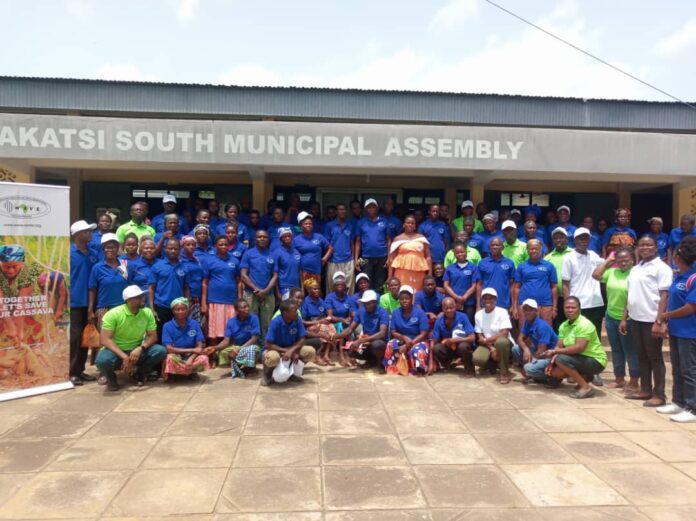
The Central and West African Virus Epidemiology (WAVE) in collaboration with Council for Scientific and Industrial Research (CSIR), has held a sensitization and awareness seminar on cassava viral diseases for some 100 farmers selected from within the Akatsi South District of the Volta region.
The one day seminar focused on improving understanding of virus threats to roots and tuber crops, increasing women participation in scientific, monitoring and leadership activities to improve surveillance of root and tuber viral diseases in 10 Central and West African countries.
The project is to also encourage the increasing use of virus epidemiological models among stakeholders in participating countries, to increase demand and availability of clean planting materials to ensure West and Central African breeders are using accurate information for identification and deployment of resistant/tolerant root and tuber crops among others.
The farmers were taken through cassava viral diseases such as the cassava mosaic disease, cassava brown streak disease, cassava frogskin disease among others.
Speaking at the event, the Akatsi South Municipal Director of Agriculture, Mr. Charlse Grunitzky said Akatsi South produces about 20 metric tones per year but noted that pest and diseases continue to affect production.
“We are one of the major producers of cassava in Ghana. As we know, diseases and pests reduce our crop yield in terms of cassava production, and so with this training, we have facilitators from CSIR to come and train farmers on how to identify diseases that cause reduction in yield of cassava in the municipality,” he said.
Dr. Allen Oppong, a facilitator from WAVE, stressed the need for farmers to be able to identify diseases and practice resistant crop planting on their field since cassava alone constitutes about 21% of crop GDP in Ghana to protect livelihood and sustain the growing industries that depend on cassava.
“I advise when they are farming, they should look at their farm and monitor it closely. They should plant healthy planting materials, the improved ones; especially the ones recommended by the extension officers,” he advised.
“Secondly, there is a disease not reported in our country but prevalent in East Africa and moving Westwards. It is called the Cassava Brown streak virus disease. It affects the leaves, stem and tuber. Once it affects the plant, you can’t use it for anything, so we want farmers to be aware and be observant on their fields and report any strange disease they may find,” he stressed.
Benedicta Nsiah Frimpong, a research scientist and an agricultural economist at CSIR also advised the the farmers to grow improved varieties and also impact the knowledge they have gained into other farmers who were not opportune to be part of the training.
The WAVE Regional Center of Excellence for Transboundary Plant Pathogens is an important scientific and technical platform at the service of African farmers.
The Center has been designed to respond effectively to transboundary plant pests and viral diseases’ evolving threat on the continent’s food security.
According to the FAO, these plant pathogens significantly affect agricultural productivity in Africa by causing annual yield losses of 40% of food crops.
The training project has funding support from the Bill and Melinda Gates Foundation.
Source: Ghana/Starrfm.com.gh/103.5FM/Faisel Abdul-Iddrisu

